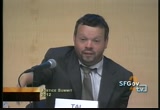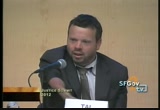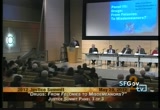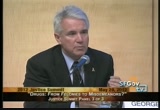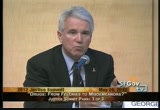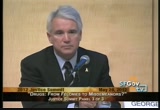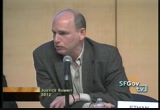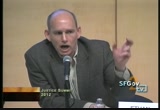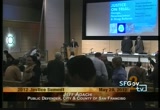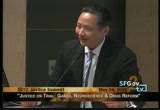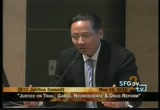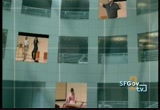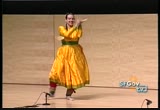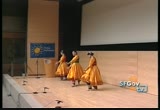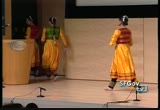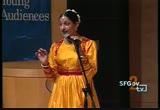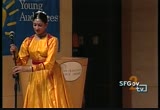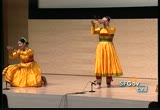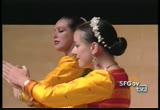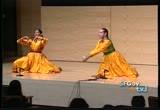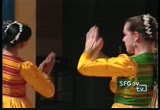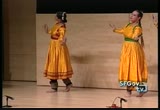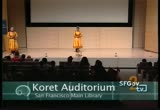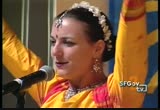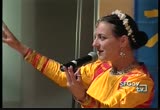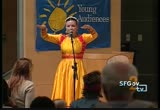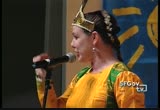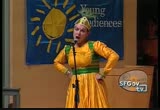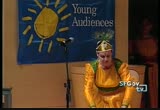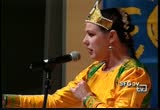tv [untitled] November 13, 2012 4:00am-4:30am PST
4:00 am
4:01 am
you're not ending the war on drugs. we need to think of at holistic play as a public-health problem. not as a rush also the people who are selling and people are selling a rock to a police officer pretending to be an addict. all those people need help. >> i think that have given my all for the cause. i will leave it to george to put the capper on it. >> what is the sanction for
4:02 am
opposing -- he is one of your members. >> he is and he is a valued member of the association. as an elected official, he is entitled to his own opinion. >> thank you. i have to say that, i want to think marty for coming here. he knew he was coming into this. i want to repeat. i am in the minority in the association. i think concerning this item, it is important for me and all of us to recognize there are ballot
4:03 am
points of view. if we're serious about developing solutions that work for all of us, we have to entertain those points of view and tried to reach consensus. that is the only one that we will create a workable, sustainable solutions. all we're doing is spinning our wheels. my reason for being here is because i truly have come to the conclusion that it is not only based on years on the ground operationally but years of working on development of public policy, working with state governments and justice and lower in corp. -- incarceration and working with other people. a variety of settings. i do not believe that incarceration has taken us where we need to be.
4:04 am
i believe the war on drugs has been a failure. when we institutionalize people over extended periods of time, we take low-level offenders in the early stages and harden them and we send them to the university of crime. by the time they get out of prison, they become a bigger social problem. where i come from, whether it is the [unintelligible] i am on the side of saying we need to reform our system and reduce the number of people we send to jail or prison. we need to reserve that space for people that are truly dangerous and have no way of fixing themselves. we have to realize there will be some people that will go to prison because the rest of us need to have some people in prison in order for us to be safe but that is a small
4:05 am
minority. there are many other solutions out there whether it is someone who has engaged in drugs or has a drug addiction. or engaging in some other low- level crime. every move away from a cursory those people in the early stages and deal with different forms of behavior modification, we're not only going to be a safer society but we are a more just society and we will spend more money in parks and schools and many others. [applause] >> i will give you the final word. >> i thought a person who was most provoking was marty. but it was [inaudible] i wanted to finish with this. i wanted to bring it back to what i think are three key ethical -- the first one is
4:06 am
this. i do not think that there is any legitimate basis in science, medicine, or any ethical code that i know of or the bible, for that matter for our criminal law tdistinguishing between those wo have alcohol and tobacco and people who put other substances in their body. there is no legitimate basis for distinguishing between the alcoholic on the one hand under criminal law and between the drug addict on the other. that is first. the second ethical point is i hope most of you agree with this. i do not believe that anybody should be punished simply for what we put into our own bodies absent harm to others. nobody deserves to be punished for what we put in our bodies
4:07 am
absent harm to others. hurt somebody, yes and not tell me your addiction was the excuse. we need to be regarded as sovereign over our minds and bodies. the criminal law should not be treating anyone as a criminal for what we put in here. when one is trying to pursue a particular public health or public safety objective, reducing the harm of drugs or whatever it might be. and when you have powerful evidence that a non-course of system can accomplish that public safety health objective as well or better than a course of system, when the portugal- like object of can accomplish that for better or lower cost, it is a matter of good public policy and a matter of ethics and morality. those three key moral points are
4:08 am
fundamental in the state in this country. thank you. >> in closing the program, i want to thank all of you for coming to the 2012 justice summit. one thing that has distinguished our work in what we have done at these summits is action. if you look at over the past nine years, we have the evidence to prove that. out of our first summit came the call to have a community based collaboration that helped use and families work together on a community-based level. we have developed the programs for growth in our communities.
4:09 am
out of the second summit came a call for better coordination of services and from that sprung the re-entry council. the official policy body. what we're looking to achieve this year is to make strides going forward particularly in the area of violence reduction and gangs. we have heard about the strategies today. we have seen the promise of law enforcement being able to work together with community-based organizations dedicated to violence reduction. this is possible but only of you all get involved. so for those of you that are here and watching at home, get involved and pick up the phone. you can go to our website to keep up with developments, sfpublicdefenderorg. we are creating initiatives around gangs and violence
4:10 am
reduction. and applying brain science to the law, and advocating for reform. this is a banner year for criminal-justice. we have the three strikes initiative. we limit it to only serious offenses. also, the ballot measure, the state measure which will eliminate the penalty. thank you, all of you for coming and for all the volunteers that made this possible. i want to thank the san francisco public library, every year they have provided us with a venue to do this event and also for sfgovtv for putting us on the tube. we will see you again. keep in touch. thank you. [applause]
4:14 am
4:15 am
india. today we are sharing an form. we are members of the dance company based here in san francisco and we are taught by somebody who has been doing this art form for over 50 years much the ladies including myself we have been studying with him for a long time. you will see different things. lots of sounds with our feet. a little bit of story telling through mime and expression and you will learn about math in dance. who would have thought. today we will start, our next piece means the coloring of the stage. dancers show the hindu aspect of the dance by using the positions of our hands we will show you we are decorating the stage and make a water picture and
4:16 am
4:22 am
[applause] good morning. afternoon, actually. so, as you can see this is an elaborate dance form and has many hand movements which have a specific meaning. in the piece we are about to show you and share with you we will actually pi lly teach you d movements. this means to tell a story. in old times they would travel
4:23 am
and tell the stores about the events of the timeses. i need you all to stand up to learn these. excellent. take a stretch. lift our arms up high to the sky. we will start by creating trees. we will turn our arms into tree branches. our finger tips into leaves and we will sway in the breeze. when the wind picks up we will sway faster. we will make birds by taking our hands facing etch other, cross our thumbs and using our hands like bird wings. the birds are flying high above the treetops. in the forest is a river. we will lift our wrists and lower them to make water waves. very soft.
4:24 am
you can hear the water flowing. in this river are fish. we will take the right hand over our left and use our thumbs like fish fins and let your fish swim through the water it takes a big dive. >> and growing next to the river are a bed of flowers. opening one hand onfinger at a time watching the flower petal blossoms. we will take our other hand and turn it into a butterifiy much the butter fly will fly, fly, fly the and land on the flour and watch it fly away. drinking can a deer. take your thumb and the outside a n antlers.
4:25 am
the deer hears a noise and in the distance is a hunter with a low and arrow. he sees that deer and aims for it. see your target and takes a shot and he misses and the deer escapes. the hunter's frustrated. i can't believe i missed that. he decides that hunting deer is not a night idea next time he will aim for an apple. thank you participating, you can sit down. give yourself a clap. those are very basic hand movements we use to tell a story. so, the next story we will show you is going to take place in this forest that we just created. i want you to imagine you are in the old forest and we will explain to you the story.
4:26 am
>> that was namaste. the devine in me greets the devine in you. can you say that? very good. so, as joe anna was saying. this come from the word meaning to tell stores. this is a story teller. you guys i heard out there i was listening a birdie told me you thought you were going to see a movie; right ? >> you are. in the old days this comes from what country? india. thousands of years ago and hundreds of years ago in india there were no movie theatres, no television, no radio, no comic books or no books for people like you and me to read.
4:27 am
was this the same here? >> yes. all offer the world it was like that. ask your parents. they can tell you what it was like before the internet. so, people told stores. i bet you tell stories. did you tell a story today? >> yeah, i bet you did you went up to our friend and said, did you see that? your friend said, no, no he didn't. right? that's a story. so, i will tell you a story. in india, here we have super heroes like, tell me a hero. >> super man. we have super heroes in india. krishna. lifts mountains and throws them
4:28 am
to the ocean to create bridges. i will tell you the story about a super hero. krishna as a little boy in the village where the trees blow and the water flows and the birds fly and the grass grows, in this village there are cows. and people and they go to the river and they go to get their water. and they go to the river and what do they see? an evil demon is polluting the river. callia. and they can't get water because it's killing the cows and the people. so, they go to krishna and say, please, do something about this this is not good. he says, he thinks about it and
4:29 am
says, okay. he takes his friends to the river to play. they play ball. they play with the ball and then by accident or may be not, the ball goes in the -- river. and callia is in the river. krishna is swimming through the dark waters and sees the ball is in the tail of the serpant demon. he sees the ball and the demon is sleeping. so guess what he does? he picks up the tail and slowly pulls it and then -- he wakes him up. okay. kruk nais
80 Views
IN COLLECTIONS
SFGTV2: San Francisco Government Television Television Archive
Television Archive  Television Archive News Search Service
Television Archive News Search Service 
Uploaded by TV Archive on

 Live Music Archive
Live Music Archive Librivox Free Audio
Librivox Free Audio Metropolitan Museum
Metropolitan Museum Cleveland Museum of Art
Cleveland Museum of Art Internet Arcade
Internet Arcade Console Living Room
Console Living Room Books to Borrow
Books to Borrow Open Library
Open Library TV News
TV News Understanding 9/11
Understanding 9/11